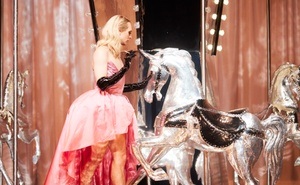DIE LUSTIGE WITWE
In the organizer's words:
In order to reorganize the cash-strapped state of Pontevedro, which has fallen into financial difficulties, the Pontevedrian envoy Baron Zeta organizes a lavish party in Paris with the ulterior motive of saving the last private financial reserves for the fatherland. After all, the only way to avert the threat of national bankruptcy seems to be to marry the millionaire Pontevedrian widow Hanna Glawari to a fellow countryman. The suitable marriage candidate is the fun-loving Count Danilo Danilovich, who, however, has a somewhat dubious reputation, so that there is initially no real spark between him and the widow, an old "ex" of Danilo's, who is quite willing to marry. Only after numerous confusions and adventurous misunderstandings do the couple finally find each other.
With the premiere of Franz Lehár's "The Merry Widow" on December 30, 1905, the era of the so-called "silver operetta" reached its peak and brought the genre an incomparable flowering. To this day, the work is one of the most frequently performed operettas of all time and numerous musical numbers, such as Hanna's Vilja song or Danilo and Hanna's final confession of love "Lippen schweigen", are still among the immortal evergreens of musical entertainment theater. With his inexhaustible melodic ideas and enchanting orchestral colors, which range from the elegant Parisian soundscape of Act 1 to the folkloric melodies of Act 2 and the erotic and frivolously charged atmosphere of the Parisian nightclubs in Act 3, Lehár hit the nerve of his time. In his new production for the Gärtnerplatztheater, Staatsintendant Josef E. Köpplinger traces the sensitive psychological depths of this timeless classic.













